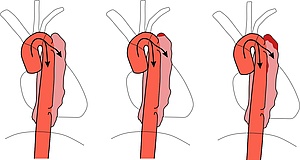
Mechanics, Modeling and Simulation of Aortic Dissection
The human body in general can be seen as an enormous source of uncertainty and complexity. Our understanding of the mechanisms behind aortic dissection and the aorta is therefore limited. Sensitivity analysis techniques reduce the unpredictability of model responses and in particular the disease mentioned above. By reducing the number of random variables in the computational phase, sensitivity analysis simplifies the diagnostic process and facilitates the development of patient-specific models. The project is being carried out as part of the GCCE, whereby several institutes are working on the modelling of aortic dissection. For further information, please refer to the project homepage.
Duration: 01.03.2018 - 01.03.2024
Contact: Ass.Prof. Gian Marco Melito gmelito@tugraz.at
Institute of Mechanics
Kopernikusgasse 24/IV
8010 Graz
Tel.: +43 (0) 316 873 - 7141
ifm@tugraz.at
